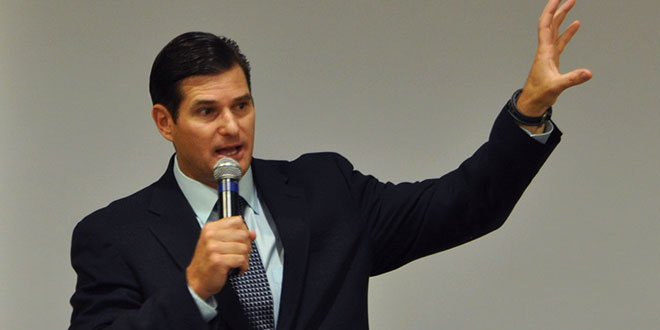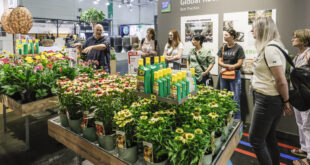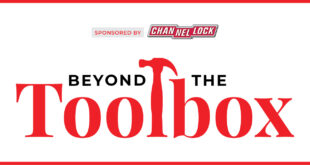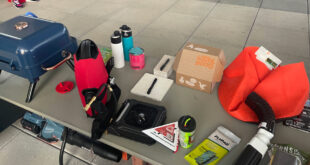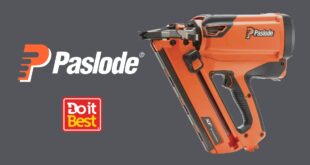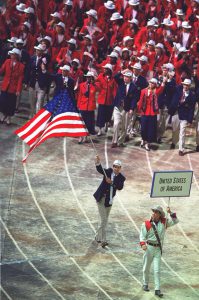 When Cliff Meidl entered the workforce as a plumber’s apprentice with a construction company, he was eager to soak up all the knowledge he could. And while he was focused on growing and learning the trade, one mistake changed his future dramatically—an accident on the job site.
When Cliff Meidl entered the workforce as a plumber’s apprentice with a construction company, he was eager to soak up all the knowledge he could. And while he was focused on growing and learning the trade, one mistake changed his future dramatically—an accident on the job site.
Meidl was operating a jackhammer when it made contact with three live subsurface electrical cables. This immediately sent him into cardiac arrest due to the severe electrical shock. It caused serious electrical burns and exit wounds, which burned over 15 percent of his body. The burns included exit wounds on his back, head and foot, but most of the damage was done to his knees. Doctors recommended amputating his legs, but his mother found UCLA plastic surgeon Dr. Malcolm Lesavoy, who came up with an innovative procedure to save his legs.
After many surgical procedures and an extensive rehabilitation process, Meidl gained the ability to walk again and later to learn and excel in the upper-body sport of kayaking. Miraculously, ten years after the accident, Meidl realized his dream and went on to compete in the 1996 Olympic games in Atlanta. Four years later, he competed again in the 2000 Olympic Games in Sydney and received one of the highest honors. He was selected as the flag bearer for team USA in the Opening Ceremony at the Sydney Games.
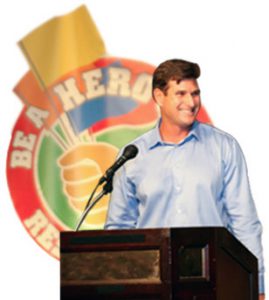 Today, he is a motivational and safety speaker and also a spokesperson for both the OSHA Training Institute at Cal State Dominguez Hills and One Calls of America, focusing on the importance of worker safety and safe digging practices in the “Contact 811 Before You Dig” initiative. This work has inspired companies to provide education and training, encouraging employees to work safely on the job.
Today, he is a motivational and safety speaker and also a spokesperson for both the OSHA Training Institute at Cal State Dominguez Hills and One Calls of America, focusing on the importance of worker safety and safe digging practices in the “Contact 811 Before You Dig” initiative. This work has inspired companies to provide education and training, encouraging employees to work safely on the job.
Hardware Retailing spoke with Meidl to learn about how his accident changed the way he thinks about safety and discovered what retailers can do to help their professional customers invest in employee safety. From providing personal protective equipment (PPE) to offering additional safety training to prevent accidents, Meidl offers practical tips and insights for retailers to share with their customers.
Hardware Retailing (HR): Can you tell us a little bit about yourself and what happened to lead you to become a safety advocate and motivational speaker?
Cliff Meidl (CM): When I was 18, I was offered a job working on a construction site. It was a great opportunity for me to not only learn a trade but also be immersed in an environment where I was able to learn from others and be mentored by those who worked in construction for many years.
About two years into my apprenticeship program, I was performing a quick side job that required me to use a jackhammer. Within a few minutes of jackhammering, my life changed forever when I struck three buried power cables where I was drilling. I often reflect back and think what if the situation was different? How could this accident have been prevented?
Yet because I went through this unfortunate incident, it provides me today with the opportunity to share my story and focus on inspiring workers and their employers to always put safety first. Our primary goal should be to make sure we go to work and return home safe to our loved ones. In order to accomplish this goal, I believe it is our personal responsibility and accountability to others to work safely on a daily basis. By building a sound workplace safety culture, we can inspire the behavior in others to work safe at all times.
HR: What do you say to those who don’t want to spend a lot of time talking about or training employees on workplace safety?
CM: I think it is foolish not to constantly focus on workplace safety, safety procedures and training. If you think you’re invincible, and it’s not going to happen to you, you’re wrong. Not taking the proper safety steps can increase your risk of injury or death.
Zero injuries should be the focus for everyone, and we can achieve it. We just need to believe, trust, educate and train ourselves in safety and apply accountability to everyone. This includes employees and employers working together towards building and respecting a strong culture of safety.
Workers and employers should always take the opportunity to understand and utilize all specific safety equipment that is required for the task at hand and follow proper procedures for all jobs.
In addition, I would always recommend taking the 30,000-foot visual approach to everything you do, especially on the worksite. This includes anticipating your surroundings; recognizing potential hazards; evaluating how to keep everyone working safely and removing any hazards if possible.
I remember one time overhearing a young apprentice asking a lineman if his job was dangerous. His response was simple. He emphasized there are hazards in all types of work and trades. But, we can work around those hazards by working safely. Danger is what you put yourself in by not working safely.
HR: How can retailers advocate for safe work environments and be a trusted resource for companies that buy safety equipment for their workers?
CM: I think one of the most important things a retailer can do if they sell safety equipment is advocate that safe work environments are critical and it is the responsibility of both parties to provide the means to work safely. One has to develop that personal connection and demonstrate that worksite safety is No. 1 to their customers. It’s all about people based safety and an injury to one is an injury to all.
I believe this requires a commitment for both retailers and companies to adopt and implement safety protocols, such as training, education and mentoring, which can foster a safe working environment.
The next step is the personal connection—Inspiring personal accountability in workers. This can be a critical stage towards getting the ultimate buy-in and trust when building a safe working environment. This can provide a great opportunity for retailers to acknowledge their commitment to safety and their customer, and at the same time, reinforce their product knowledge.
For example, in a retail environment, there may be a customer considering the purchase of a shovel or digging equipment they sell. As a retailer, understanding what specific type of work the customer may be performing can be a big advantage. A retailer could share with their customer their specific knowledge around excavation and tooling and encourage them to utilize safe digging practices. Emphasize to them the importance of contacting 811 before they dig. Often, people are unaware that the simple installation of a fence, mailbox or even lawn sprinklers or excavation work requires making that call to 811. In fact, in most states, it’s the law. There are many other ways to create safety awareness amongst your customers. The simple application of safety posters and stickers on tools and excavation equipment can be another effective way.
Place a “Contact 811 Before You Dig” sticker on a shovel or tiller. You will be sure to get the message across, at least, someone may ask you a question. Or give your local 811 center a call or OSHA and they would be happy to supply you with items to get the word out.
By taking the initiative to show that you care and understand the possible safety issues that may occur from a variety of projects around the home or job site, this may enhance the overall customer experience. Taking the extra step demonstrates you appreciate their business. It’s the small gestures that count.
HR: What do you suggest retailers and their customers do to better understand the rules and regulations provided by OSHA?
CM: To start, I would recommend familiarizing yourself with the general OSHA Safety regulations in your industry. This information is available through the United States Department of Labor’s OSHA website. Their website also provides many other additional resources that may be helpful.
In addition, I would recommend contacting your regional OSHA Training Institute and Educational Center for further resources on education and training. This may be helpful understanding what type of training and educational programs are required for your industry and incorporating them into your current safety and training program at your company.
I would also encourage retailers to share with their customers the importance and benefits of working with OSHA resources and to make sure their workers and workplaces are safe. OSHA training is a great vehicle to help educate all employees and employers. Educational resources are critical. It helps teach workers the skills and procedures necessary to create a safe work environment.
For more information about Meidl, visit CliffMeidl.com.
 Hardware Retailing The Industry's Source for Insights and Information
Hardware Retailing The Industry's Source for Insights and Information


